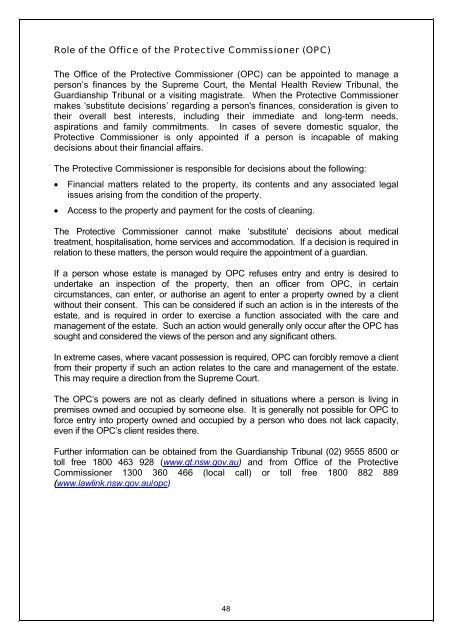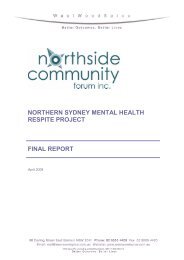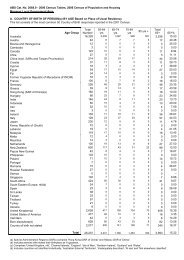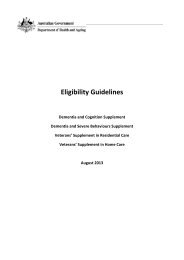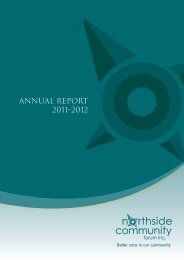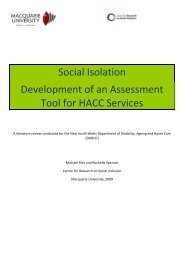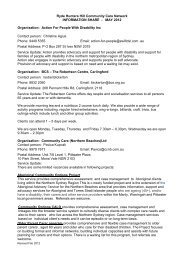Guidelines for field staff to assist people living in ... - Housing NSW
Guidelines for field staff to assist people living in ... - Housing NSW
Guidelines for field staff to assist people living in ... - Housing NSW
Create successful ePaper yourself
Turn your PDF publications into a flip-book with our unique Google optimized e-Paper software.
Role of the Office of the Protective Commissioner (OPC)The Office of the Protective Commissioner (OPC) can be appo<strong>in</strong>ted <strong>to</strong> manage aperson’s f<strong>in</strong>ances by the Supreme Court, the Mental Health Review Tribunal, theGuardianship Tribunal or a visit<strong>in</strong>g magistrate. When the Protective Commissionermakes ‘substitute decisions’ regard<strong>in</strong>g a person's f<strong>in</strong>ances, consideration is given <strong>to</strong>their overall best <strong>in</strong>terests, <strong>in</strong>clud<strong>in</strong>g their immediate and long-term needs,aspirations and family commitments. In cases of severe domestic squalor, theProtective Commissioner is only appo<strong>in</strong>ted if a person is <strong>in</strong>capable of mak<strong>in</strong>gdecisions about their f<strong>in</strong>ancial affairs.The Protective Commissioner is responsible <strong>for</strong> decisions about the follow<strong>in</strong>g:• F<strong>in</strong>ancial matters related <strong>to</strong> the property, its contents and any associated legalissues aris<strong>in</strong>g from the condition of the property.• Access <strong>to</strong> the property and payment <strong>for</strong> the costs of clean<strong>in</strong>g.The Protective Commissioner cannot make ‘substitute’ decisions about medicaltreatment, hospitalisation, home services and accommodation. If a decision is required <strong>in</strong>relation <strong>to</strong> these matters, the person would require the appo<strong>in</strong>tment of a guardian.If a person whose estate is managed by OPC refuses entry and entry is desired <strong>to</strong>undertake an <strong>in</strong>spection of the property, then an officer from OPC, <strong>in</strong> certa<strong>in</strong>circumstances, can enter, or authorise an agent <strong>to</strong> enter a property owned by a clientwithout their consent. This can be considered if such an action is <strong>in</strong> the <strong>in</strong>terests of theestate, and is required <strong>in</strong> order <strong>to</strong> exercise a function associated with the care andmanagement of the estate. Such an action would generally only occur after the OPC hassought and considered the views of the person and any significant others.In extreme cases, where vacant possession is required, OPC can <strong>for</strong>cibly remove a clientfrom their property if such an action relates <strong>to</strong> the care and management of the estate.This may require a direction from the Supreme Court.The OPC’s powers are not as clearly def<strong>in</strong>ed <strong>in</strong> situations where a person is <strong>liv<strong>in</strong>g</strong> <strong>in</strong>premises owned and occupied by someone else. It is generally not possible <strong>for</strong> OPC <strong>to</strong><strong>for</strong>ce entry <strong>in</strong><strong>to</strong> property owned and occupied by a person who does not lack capacity,even if the OPC’s client resides there.Further <strong>in</strong><strong>for</strong>mation can be obta<strong>in</strong>ed from the Guardianship Tribunal (02) 9555 8500 or<strong>to</strong>ll free 1800 463 928 (www.gt.nsw.gov.au) and from Office of the ProtectiveCommissioner 1300 360 466 (local call) or <strong>to</strong>ll free 1800 882 889(www.lawl<strong>in</strong>k.nsw.gov.au/opc)48


